DUP leader Arlene Foster attends Ulster GAA final
- Published
DUP leader stands for Irish national anthem at GAA match
Democratic Unionist Party (DUP) leader Arlene Foster has attended a major Gaelic games match for the first time.
She was among the crowd at the Ulster Football Final between Donegal and Fermanagh in County Monaghan.
Speaking before the game, Mrs Foster said she realised that some may be "uncomfortable" with her attendance, but that her party wanted to take steps towards a "shared society".
Mrs Foster stood for the Irish national anthem.
It is the first time a senior unionist politician has gone to a Gaelic Athletic Association (GAA) game since Peter Robinson in 2012. Mrs Foster took her seat for the match near Sinn Féin's Michelle O'Neill.
Arlene Foster attends a GAA match in County Monaghan
She was accompanied into the stadium by DUP MLA Christopher Stalford and Irish Enterprise Minister Heather Humphreys, a TD (MP) for Cavan-Monaghan.
Speaking as she arrived, Mrs Foster said: "Of course it's not my first time in Clones, I grew up not so very far away from here, but it is my first time at St Tiernach's Park.
"I want to say a big thank you to the Ulster Council of the GAA for the very warm welcome that I've received."
She added: "I do realise that there are some people that may be uncomfortable with me being here today on a Sunday, but let me say this, I am the leader of a political party that wants to have a shared society in Northern Ireland and to do that we have to take steps forward.
"To do that we also have to build a respect and a tolerance and that's what I want to do. I hope that others will take the chance to step forward as well and to understand and appreciate and tolerate another culture perhaps that isn't theirs.
"I understand the significance of me being here as well today, so I hope I enjoy today."
Mrs Foster, who is from County Fermanagh, met members of her native county's team last Saturday.
The final score was Donegal 2-18 Fermanagh 0-12.
Councillor Howard Thornton, the Ulster Unionist chair of Fermanagh and Omagh Council, also attended the match.
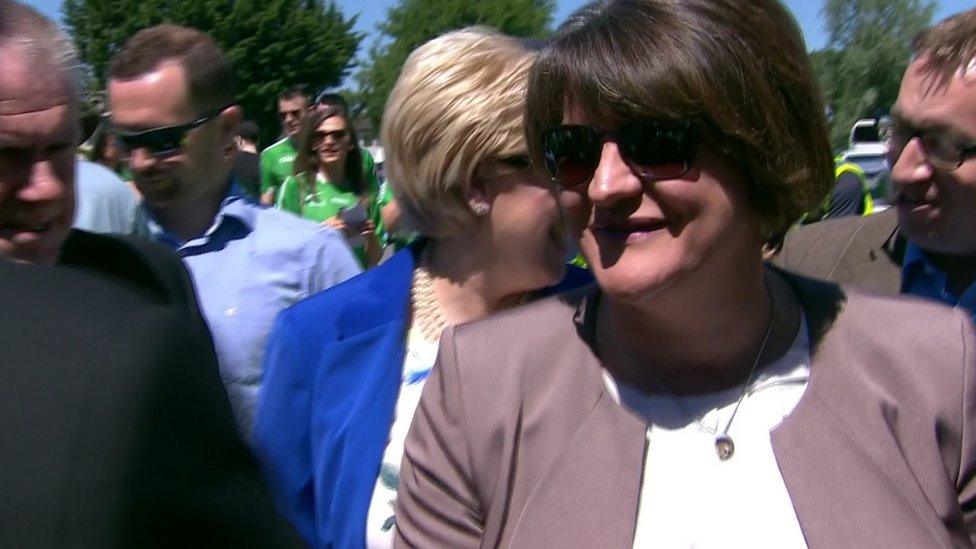
Arlene Foster was welcomed by cheers of 'Come on Arlene' when she entered St. Tiernach's Park in Clones, County Monaghan

At the scene
Richard Morgan, BBC News NI reporter
Arlene Foster arrived to cheers and claps and chants of "Come on Arlene".
It was all smiles from Mrs Foster who, when I asked if she was happy to be here, said she was.
Many Fermanagh fans welcomed her arrival at Clones.
The dozen or so people I spoke to believe it is a good thing for the county, and for politics.
When asked at Clones about Mrs Foster's attendance, Michelle Gildernew said: "It's only but right. It's a huge day for Fermanagh, for the entire county, and I'm hoping everyone enjoys the match.
"She'll certainly see a spectacle she never expected to see."

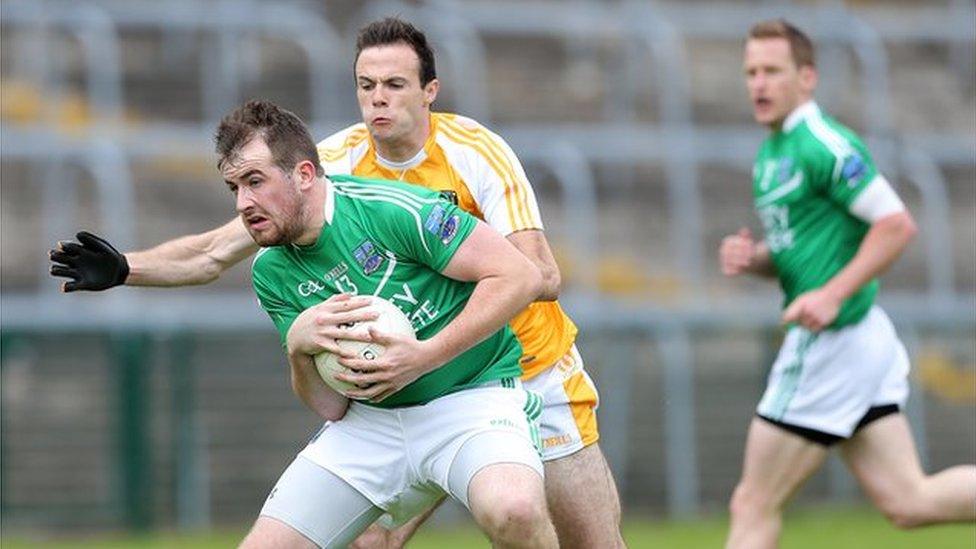
Fermanagh (in green) are taking on Donegal in the Ulster Football Championship final on Sunday

Analysis
Jayne McCormack, BBC News NI political reporter
Arlene Foster has gone where no senior unionist politician has gone before - her decision to cross the Irish border to County Monaghan for this game will not go unnoticed.
DUP politicians have, in the past, attended GAA games in Northern Ireland, but today's journey is significant for the former first minister who once said she didn't do "gesture politics".
She will attempt to reach out to another community later this week when she attends an LGBT event at Stormont.
Whispers that these moves could mark the beginning of a defrosting of relations to try to jumpstart talks with Sinn Féin this autumn may be somewhat premature.
And there may be others who feel Mrs Foster's actions are simply a box-ticking exercise or photo opportunity.
But longer term, history may look back kindly on the current DUP leader for making the journey to Clones to cheer on her home team.

Unionism and the GAA
The first page of the GAA's official guide outlines that the organisation's "basic aim is the strengthening of national identity in a 32-county Ireland through the preservation and promotion of Gaelic games and past times".
It is a statement that underlines the nationalist ethos of the 134-year-old organisation - and has fuelled unionist mistrust.
However, in recent years, moves by both unionist politicians and the GAA have becoming symbolic of a thawing relationship.
The GAA abolished Rule 21, which banned members of the security forces from being members of the GAA, in 2001 and modified Rule 42 in 2005, which allowed rugby and football to be played in Croke Park, the GAA's headquarters, for the first time.
Meanwhile, the DUP's Edwin Poots became the party's first politician to attend a GAA match in an official capacity, external in 2008 in his then role as Stormont's sports minister.

Peter Robinson and Martin McGuinness were the guests of the GAA's Ulster Council at the Dr McKenna Cup final in 2012
In 2012, then first minister Peter Robinson attended the Dr McKenna Cup final along with then deputy first minister Martin McGuinness.
At the time, party colleague Gregory Campbell described it as a "symbolic gesture" and said the "GAA were travelling in the right direction for some time now".
However, he said there was still more work to do and unionists have often cited the naming of stadiums and clubs after former IRA members as reasons for concern.
In 2010, Ulster Unionist Party leader Tom Elliott said he had no interest in attending a GAA match.
While he later rowed back from that position, his position is reflected by many in the unionist community.
This move by Arlene Foster - at the biggest occasion in Ulster GAA - is the biggest sign of rapprochement between unionism and the GAA to date.
- Published16 June 2018
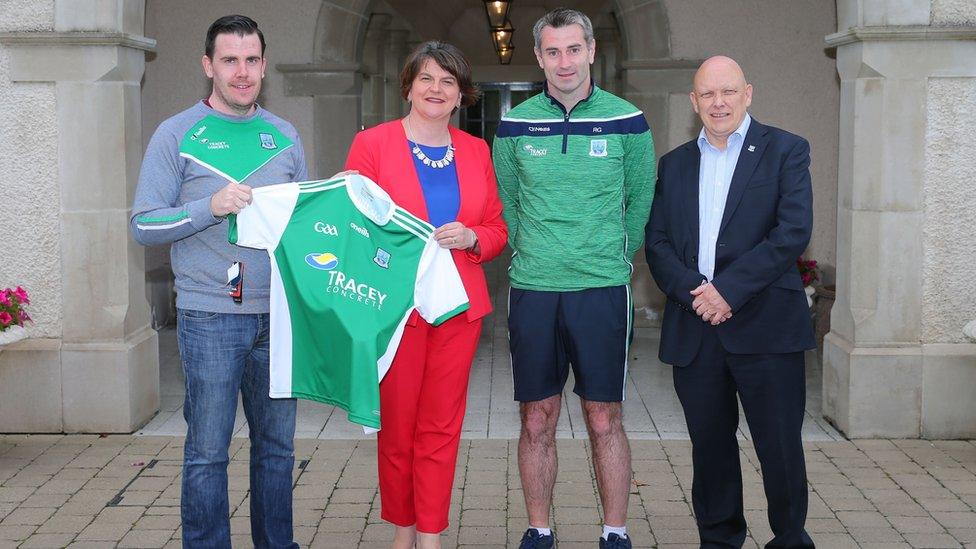
- Published30 January 2012
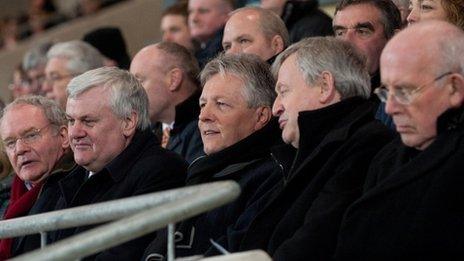
- Published25 November 2016
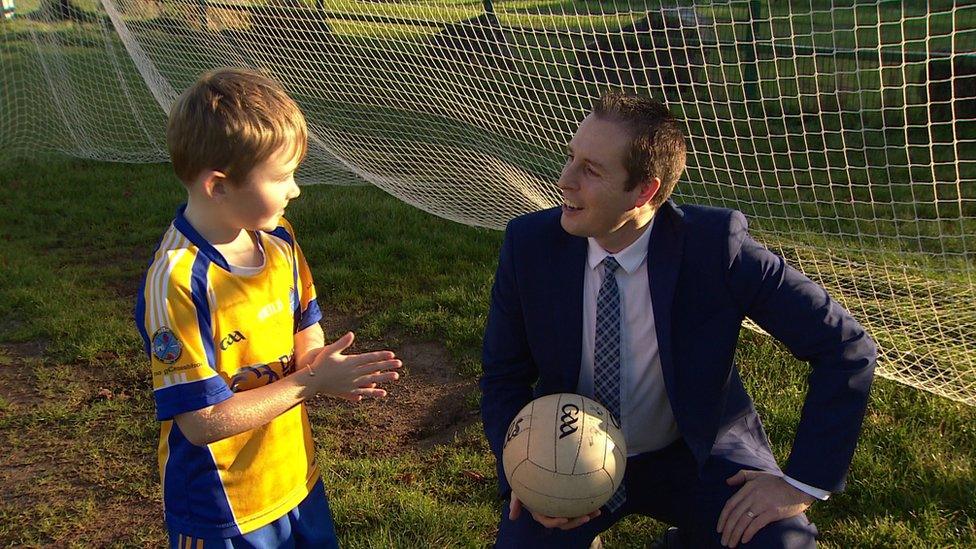
- Published25 November 2010